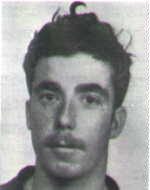Son of Moshe and Dora. He was born on February 28, 1949 in Kibbutz Sarid. He completed his elementary studies at the children’s kibbutz in Sarid and completed his high school studies at the kibbutz educational institution. He was a member and a member of the Hashomer Hatzair movement. Ehud loved nature, loved to wander the country’s paths, a lot of walks and all movement activities was for him an experience of joy and happiness. When he came back from the walks, he brought in various plants, which he planted in the garden, which he cultivated near his parents’ house. He belonged to the Department for the Protection of Nature and within the framework of the department enlisted in helping to preserve and cultivate the parking lots in Ein Gedi and Eilat. All this he did with great love and devotion. When he finished his studies, the idea of establishing a kibbutz by the kibbutzim and his time before enlisting in the IDF was very appealing to the idea, and he, as a shaliach, wanted to convince his classmates and acquaintances in the distance, On the border of the strip, a kibbutz of kibbutz members only – Kerem Shalom – at first he worked in Shlachin, a branch in which he also worked in his home, in Sarid, and later on he was assigned a new branch – His time and all his energy in learning the problems of the establishment of the branch Kerem Shalom also had a penchant for writing, and several of his stories were published: two in “Davar LeYeladim” and “Mishmar LeYeledim” and two in his booklet, and as an enthusiastic fan of the movement and nature walks, he was very attached to his family, , Or any other encounter, his active presence was felt, and he was drafted into the IDF in late January 1968, and together with his entire group he went to the Nahal Brigade, where he volunteered for the paratroop brigade. Although he hated wars, he was willing to fight for peace in order to put an end to bloodshed. His attitude toward the Arabs was friendly and he devoted much time and thought to the idea of cooperation between Jews and Arabs. Ehud spoke extensively with his father about the problems that preoccupied him, the problems of security and the future. At the beginning of February 1970, when he was on duty at Maoz, near the Suez Canal, he was injured as a result of heavy shelling and sent to the hospital. According to the doctor’s instructions, he was given leave to continue treatment, but instead of going home, Ehud returned to Ma’oz, because he wanted to wait until the reinforcements arrived. A few days later, when the reinforcements arrived, he was about to take a vacation, but until the departure he continued to stand guard at the anti-aircraft position: When an Egyptian plane bombed the stronghold on Tuesday, February 9, 1970, Ehud was wounded and died in his stronghold. The banks of the canal. He was laid to rest in his kibbutz. His commanding officer wrote: “I found him a responsible person with a great deal of seriousness, discipline and an extraordinary willingness to help others, a strong thought, volunteerism and self-sacrifice, and above all, a lot of heartiness and joy of life. Quiet and restless, until it was ready, to the satisfaction of his superiors. ” The commander remembers him as a talented young man and once said to him: “You guys like Ehud, you can be good officers in the IDF.” Ehud responded firmly: “But I chose Kerem Shalom …” But when he saw how much he needed him and his ilk, “The commander says that when Ehud returned to the stronghold and was asked why he did not go home first, to show the parents that he was healthy, he replied,” I knew that they needed me here. ” I wanted to embrace you, to give you some of the animals in me and not to part from you. You went away from us as a friend, you were like a brother to a troublemaker and knelt down for joy – and like you left aOur hearts are empty. “On the IDF Memorial Day, in 1970, the kibbutz published a booklet called” The Redhead of All “- in memory of their son and friend.
